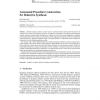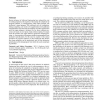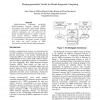145
click to vote
PEPM
2012
ACM
13 years 9 months ago
2012
ACM
We share a vision of connecting the topics of bidirectional transformation and inductive program synthesis, by proposing to use the latter in approaching problematic aspects of th...
191
click to vote
GECCO
2011
Springer
14 years 5 months ago
2011
Springer
The reward functions that drive reinforcement learning systems are generally derived directly from the descriptions of the problems that the systems are being used to solve. In so...
116
click to vote
PPDP
2010
Springer
15 years 14 days ago
2010
Springer
Program Synthesis, which is the task of discovering programs that realize user intent, can be useful in several scenarios: enabling people with no programming background to develo...
145
click to vote
ASE
2005
15 years 1 months ago
2005
Deductive program synthesis systems based on automated theorem proving offer the promise of software that is correct by construction. However, the difficulty encountered in constru...
114
click to vote
GPCE
2007
Springer
15 years 6 months ago
2007
Springer
Recent advances in Software Engineering have reduced the cost of coding programs at the expense of increasing the complexity of program synthesis, i.e. metaprograms, which when ex...
126
click to vote
ECBS
1999
IEEE
15 years 6 months ago
1999
IEEE
Model-Integrated Computing, specifically Model-Integrated Program Synthesis (MIPS) environments that include visual model building, constraint management, and automatic program sy...
120
click to vote
IPPS
2002
IEEE
15 years 7 months ago
2002
IEEE
This paper discusses a program synthesis system to facilitate the generation of high-performance parallel programs for a class of computations encountered in quantum chemistry and...
147
click to vote
BIRTHDAY
2003
Springer
15 years 7 months ago
2003
Springer
Techniques that were developed for program synthesis are being applied to allow multiple agents to communicate with each other and cooperate to solve a single problem. We illustrat...
133
click to vote
SIGSOFT
2003
ACM
15 years 7 months ago
2003
ACM
1 Step-wise refinement (SWR) asserts that complex programs can be derived from simple programs by progressively adding features. The length of a program specification is the number...
112
click to vote
SSS
2007
Springer
15 years 8 months ago
2007
Springer
In this paper, we concentrate on distributed algorithms for automated synthesis of fault-tolerant programs in the high atomicity model, where all processes can read and write all p...



